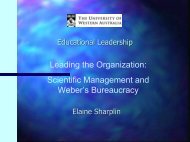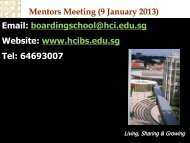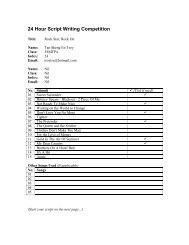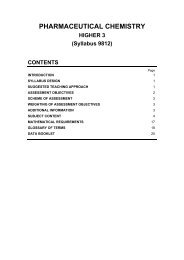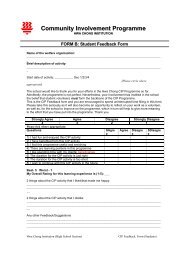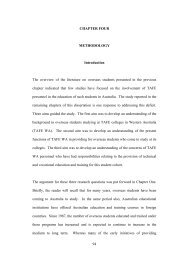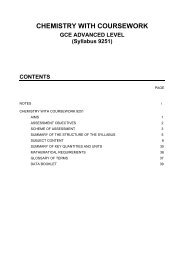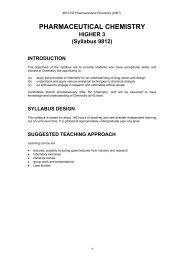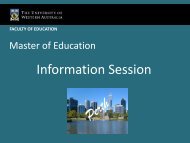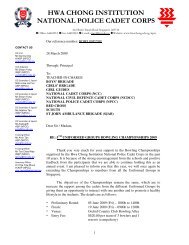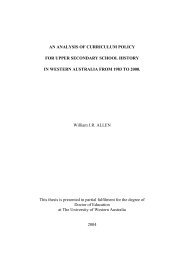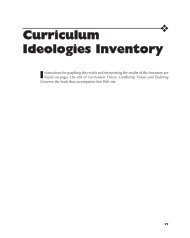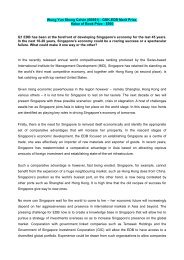EDUC 8678 - Pre-reading - Curriculum and its discontents
EDUC 8678 - Pre-reading - Curriculum and its discontents
EDUC 8678 - Pre-reading - Curriculum and its discontents
You also want an ePaper? Increase the reach of your titles
YUMPU automatically turns print PDFs into web optimized ePapers that Google loves.
168<br />
PHILIP W. JACKSON/CI<br />
The proposed shift in scholarly allegiance is away from what is increasingly<br />
referred to as "mainstream social science," a term that is usually<br />
intended to be interpreted pejoratively, <strong>and</strong> toward a wide assortment of<br />
intellectual traditions that have not heretofore been drawn upon heavily by<br />
persons interested in educational <strong>and</strong> curricular topics. These comprise, in<br />
the main, existential, phenomenological, <strong>and</strong> Marxist thought, but they<br />
also include, somewhat less prominently, the contributions of literary<br />
critics, psychoanalysts, <strong>and</strong> even a philosopher of science or two. The key<br />
ideas being drawn upon are distinctly European in flavor, with French <strong>and</strong><br />
German influences predominating. Besides Marx <strong>and</strong> Freud, others that<br />
are frequently cited in this literature include Heidegger, Husserl, Merleau-<br />
Ponty; Sartre, Schutz, Gramsci, Polanyi, <strong>and</strong> Habermas. Taken as a whole,<br />
the ideological bias of the sources drawn upon most heavily is decidedly<br />
left of center. The major argument in support of drawing upon these new<br />
sources of ideas (new for educators, that is) is, as I underst<strong>and</strong> it, that they<br />
are more helpful in thinking about <strong>and</strong> underst<strong>and</strong>ing the richness <strong>and</strong><br />
complexity of educational phenomena than are the intellectual frameworks<br />
that have till now dominated educational thought. So much then for a<br />
thumbnail sketch of the first major proposal that flows from the writings<br />
of the Discontents.<br />
The second proposal, that having to do with a change in the<br />
relationship between those who talk <strong>and</strong> write about curricular matterslet's<br />
call them the academics-<strong>and</strong> those who are closer to educational<br />
practice-the practitioners-is really split into two subproposals that<br />
move in opposite directions. The first calls for a closer relationship<br />
between academics <strong>and</strong> practitioners; the second, for a more distant one.<br />
Though supporters of both subproposals can probably be found in all four<br />
quadrants of our imaginary curricular map, I see the argument for a closer<br />
relationship concentrated in our East Anglia center <strong>and</strong> that for a more<br />
distant relationship concentrated in London. I can't quite figure out how<br />
our Hershey, Pennsylvania, folks vote on this split (I suspect they are not<br />
certain either), so I'll just leave a question mark there.<br />
The argument on behalf of a closer relationship between academics <strong>and</strong><br />
practitioners is probably the easier of the two to underst<strong>and</strong>, for it has been<br />
around a long time. Since at least the turn of the century, <strong>and</strong> probably<br />
long before that, both academics <strong>and</strong> practitioners have lamented the gap<br />
of communication <strong>and</strong> underst<strong>and</strong>ing that separates them <strong>and</strong> have<br />
sought, through various schemes, to close it. That desire is still very alive in<br />
many quarters.<br />
The most recent set of suggestions for closing the gap requires giving<br />
teachers a greater sense of partnership in educational research undertakings,<br />
even making them the dominant partners. Teachers are to participate<br />
in defining the potential problems <strong>and</strong> to be active in all phases of the<br />
investigation, from data collection (usually by naturalistic observation)<br />
through analysis <strong>and</strong> interpretation. As might be expected from what has<br />
been said so far, they are also thought to be the chief beneficiaries of what is<br />
learned.



